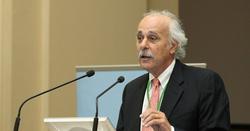Roberto Peccei, head of the DESY theory group from 1984 to 1989, passed away on 1 June in his home in Los Angeles. Born in Italy in 1942, Roberto received a PhD degree from the MIT Center for Theoretical Physics in 1969. After postdoctoral work at the University of Washington, he joined the faculty of Stanford University in 1971. In 1978 he returned to Europe as staff member of the Max-Planck-Institut für Physik in Munich, before moving to Hamburg six years later. In 1989 he joined the faculty of the Department of Physics at UCLA, Los Angeles.
Roberto Peccei has been a distinguished theoretical physicist. He made seminal contributions to the theory of electroweak interactions, the physics of heavy quarks and other areas of particle physics. He is most famous for proposing, together with Helen Quinn, the “Peccei-Quinn symmetry” as a solution of the strong-CP problem of Quantum Chromodynamics. Roberto’s research was driven by curiosity, and he was always ready to embark on new unexplored directions addressing fundamental questions in particle physics. In this spirit, together with his collaborators, he started to work on supersymmetric theories and on early universe cosmology at a time when these topics were not yet fashionable among particle physicists in Germany.
Working with Roberto was always enjoyable and inspiring. In this way he has formed and influenced a large number of young researches at an early stage of their carrier, including Marcela Carena, Graciela Gelmini, Antonio Masiero, Wolfgang Lerche, Sherwin Love, Reinhold Rückl, Carlos Wagner, Christof Wetterich, Dieter Zeppenfeld, Tsutomu Yanagida and Wilfried Buchmüller. During his time at the MPI Munich and at DESY Roberto Peccei has strongly shaped the theory groups at these two institutions, and he has played a major role in strengthening the connections between experimental and theoretical particle physics, as well as international collaborations.
Physics played an important role in interactions with Roberto, but discussions beyond physics were at least equally interesting. Roberto had a worldwide perspective, visible in particular in his engagement for the Club of Rome, founded by his father Aurelio Peccei. Roberto’s scientific work had a major impact on particle physics, and with his open and friendly personality he created an atmosphere that will be remembered and that will last among his collaborators and friends. Roberto leaves behind his wife Jocelyn, children and grandchildren.








